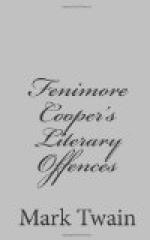then, that it was about one hundred and forty feet
long. It was of “greater breadth than
common.” Let us guess, then, that it was
about sixteen feet wide. This leviathan had
been prowling down bends which were but a third as
long as itself, and scraping between banks where it
had only two feet of space to spare on each side.
We cannot too much admire this miracle. A low-roofed
log dwelling occupies “two-thirds of the ark’s
length”—a dwelling ninety feet long
and sixteen feet wide, let us say a kind of vestibule
train. The dwelling has two rooms—each
forty-five feet long and sixteen feet wide, let us
guess. One of them is the bedroom of the Hutter
girls, Judith and Hetty; the other is the parlor in
the daytime, at night it is papa’s bedchamber.
The ark is arriving at the stream’s exit now,
whose width has been reduced to less than twenty feet
to accommodate the Indians—say to eighteen.
There is a foot to spare on each side of the boat.
Did the Indians notice that there was going to be
a tight squeeze there? Did they notice that they
could make money by climbing down out of that arched
sapling and just stepping aboard when the ark scraped
by? No, other Indians would have noticed these
things, but Cooper’s Indians never notice anything.
Cooper thinks they are marvelous creatures for noticing,
but he was almost always in error about his Indians.
There was seldom a sane one among them.
The ark is one hundred and forty feet long; the dwelling
is ninety feet long. The idea of the Indians
is to drop softly and secretly from the arched sapling
to the dwelling as the ark creeps along under it at
the rate of a mile an hour, and butcher the family.
It will take the ark a minute and a half to pass
under. It will take the ninety foot dwelling
a minute to pass under. Now, then, what did
the six Indians do? It would take you thirty
years to guess, and even then you would have to give
it up, I believe. Therefore, I will tell you
what the Indians did. Their chief, a person
of quite extraordinary intellect for a Cooper Indian,
warily watched the canal-boat as it squeezed along
under him, and when he had got his calculations fined
down to exactly the right shade, as he judged, he
let go and dropped. And missed the house!
That is actually what he did. He missed the
house, and landed in the stern of the scow. It
was not much of a fall, yet it knocked him silly.
He lay there unconscious. If the house had
been ninety-seven feet long he would have made the
trip. The fault was Cooper’s, not his.
The error lay in the construction of the house.
Cooper was no architect.
There still remained in the roost five Indians.




